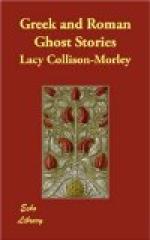But there is a story connected with the crossing of the Rubicon by Caesar that certainly deserves to be better known than it is.[111] It is only fitting that an event fraught with such momentous consequences should have a supernatural setting of some kind; and Suetonius relates that while Caesar was still hesitating whether he should declare himself an enemy of his country by crossing the little river that bounded his province at the head of an army, a man of heroic size and beauty suddenly appeared, playing upon a reed-pipe. Some of the troops, several trumpeters among them, ran up to listen, when the man seized a trumpet, blew a loud blast upon it, and began to cross the Rubicon. Caesar at once decided to advance, and the men followed him with redoubled enthusiasm after what they had just seen.
It is to Plutarch that we owe the famous story of the apparition that visited Brutus in his tent the night before the battle of Philippi, and again during the battle. Shakespeare represents it to be Caesar’s ghost, but has otherwise strictly followed Plutarch. It would be absurd to give the scene in any other words than Shakespeare’s.[112]
BRUTUS. How ill this taper burns!
Ha! who comes here?
I think
it is the weakness of mine eyes
That shapes
this monstrous apparition.
It comes
upon me. Art thou any thing?
Art thou
some god, some angel, or some devil,
That mak’st
my blood cold, and my hair to stare?
Speak to
me what thou art!
GHOST. Thy evil spirit, Brutus.
BRUTUS. Why com’st thou?
GHOST. To tell thee thou shalt see me at Philippi.
BRUTUS. Well; then I shall see thee again?
GHOST. Ay, at Philippi.
BRUTUS. Why, I will see thee at Philippi,
then.
Now I have
taken heart, thou vanishest:
Ill spirit,
I would hold more talk with thee.
But it had already disappeared, only to meet Brutus again on the fatal day that followed.
FOOTNOTES:
[Footnote 104: Ep., vii. 27.]
[Footnote 105: Plutarch, Dion, ii. 55.]
[Footnote 106: Dio Cassius, 55. 1. Cp. Suet., Claud., i.]
[Footnote 107: Lucian, Philops., 20.]
[Footnote 108: 68. 25.]
[Footnote 109: Ep., vii. 27. 12.]
[Footnote 110: Fragm., 84.]
[Footnote 111: Suet., Julius, 32.]
[Footnote 112: Julius Caesar, iv. 3.]
THE END
Billing and Sons, Ltd., Printers, Guildford



